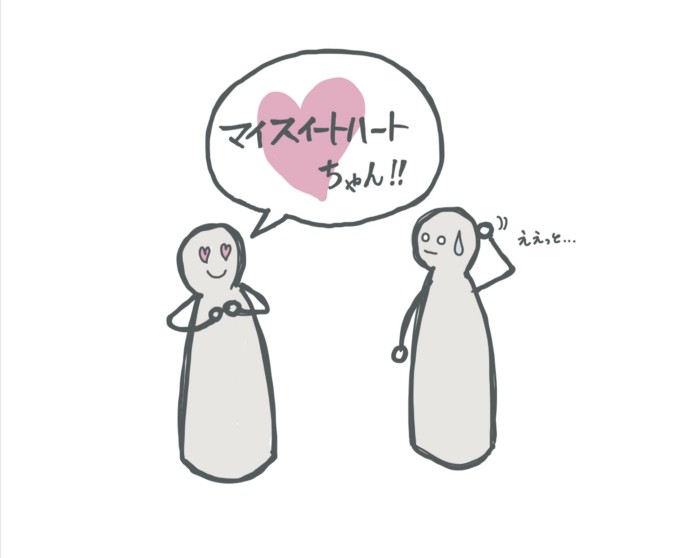Pet names in Japanese and Chinese
How do you call your partner or friends? Image by Kaito Kikuchi — Own Work

I recently watched a video from YouTubers Rachel and Jun that discussed the use of pet names for your significant other in Japanese. Rachel, who is American, discussed how common it is to hear terms of endearment in the United States, while Jun said that in Japanese, there are no words like “sweety,” “honey,” “baby,” “boo,” etcetera; instead, affection is often communicated implicitly or through modifications of a person’s name.
This made me think about nicknames broadly, both in my native language of English and the two languages I have recently studied: Japanese and Mandarin Chinese.
Japanese
My partner is Japanese, so I learned ways of showing affection in Japanese when we started dating. We are both private people, but we do use nicknames for one another in Japanese. Here are a few examples that I know of (or use) below:
— ちゃん (-chan, a suffix)
In Japanese, it is customary to attach suffixes to a person’s name. These suffixes vary in meaning and application, but ちゃん is common for couples to use with one another, or when you are talking with someone younger than you, like a child. It is a bit cutesy, so I’d only use it with my partner or close friends.
Shortened versions of a given name
Another frequent nickname format is to use ーちゃん in combination with a shortened version of a person’s name. For instance, the given name 恵子 (Keiko) could be shortened to 恵ちゃん (Kei-chan). Again, only use this with your partner or close friends; it is disrespectful to use it with acquaintances or someone older than you.
あなた (anata, “you”)
The word “you” may not seem like a term of endearment in English, but it’s quite intimate in Japanese. Culturally speaking, Japanese people often refer to each other by name or through implication, so あなた is very direct. The romantic usage of the word is primarily seen in older generations; I was told that young Japanese couples do not use あなた to refer to one another.
While the first two examples are flexible in use, those are the only pet names my partner and I can think of in Japanese.
Mandarin
Mandarin has a few more terms of endearment than Japanese, but from my experience, Chinese-speaking couples do not use these terms as publicly as English-speaking couples do. My Taiwanese friends refer to their significant others either by name or with terms like 男友 (nán yǒu, “boyfriend”), 女友 (nǚ yǒu, “girlfriend”), or 伴侶 (bàn lǚ, “partner”). Still, here are a few Chinese pet names and nicknames:
親愛的 (qīn ài de, “dear,” “beloved,” “cherished”)
You can address a significant other or someone close to you with this term. This word is an adjective, so it can be attached to a noun (e.g., 親愛的朋友, qīn ài de péng yǒu, “dear friend”) or used as a stand-alone word. I’ve been told this word sounds flowery and is a bit dramatic to use in every-day life. It’s also worth noting that unlike in English, you would not use this term to address a formal letter or email (e.g., “Dear Ms. Li”).
親 (qīn, “babe,” or “bae”)
This term is a shortened version of 親愛的. Personally, I’ve never heard it used in real life, but it is quite pervasive online. I have encountered the onomatopoeia 親親 (qīn qīn, “kiss”). Some of my friends have used the word 親親 in contexts where they want to sound cute, but it’s not used as a pet name.
寶貝 (bào bèi, “treasure”)
This is a term of endearment that I’m told couples use, but I’ve never heard any of my friends call their significant other 寶貝 unless it was a joke. I’ve heard parents refer to their small children with this word, or with 寶寶 (bào bào, “baby”).
General Nicknames
It is extremely common for friends and lovers to call each other nicknames that are variants of their own names. In Taiwan, it’s popular to attach the prefix 啊- (a-) to the second character of a given name. For instance, my Chinese given name is 宇文 (Yǔ wén), so my friends like calling me 啊文 (A-wén). Another style of nickname is 小 — (xiǎo, “little — ”). This format is used with more abstract nicknames, such as 小豬 (xiǎo zhū, “little pig,” the nickname of a celebrity in Taiwan).
Playful Insults
While my Taiwanese friends are a bit shy about using pet names, I certainly overheard a lot of playful insults. This may be more of a phenomenon for young couples (or maybe I have mean friends!), but I’ve heard them call their partners words like 白目(bái mù, “idiot” lit. “white of the eye”) regularly.
Conclusion
For readers who are learning either — or both — of these languages, it may surprise you to find such a sparse list, but cultural differences really affect how we communicate with one another. While English-speaking cultures are typically verbal, that’s not the case with Japanese- and Chinese-speaking cultures, as Jun expressed in the video I linked at the top of this article:
“If you say [terms of affection] too often, the meaning becomes a bit lighter.”
That being said, “Japanese culture” is not a monolith. To quote my Japanese partner:
“It’s nice to verbally affirm affection — I think it strengthens a relationship. I appreciate that part of American culture.”
So, like with most things, the use of pet names or nicknames comes down to context. If you have Chinese-speaking or Japanese-speaking friends, or you’re significant other is a native speaker, ask them what they prefer.
